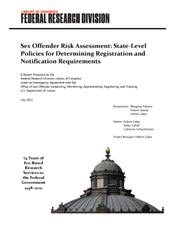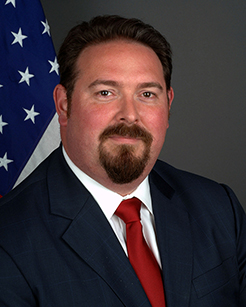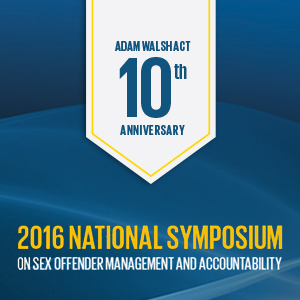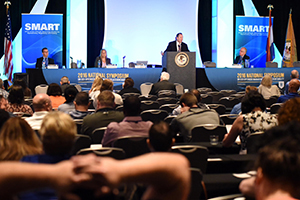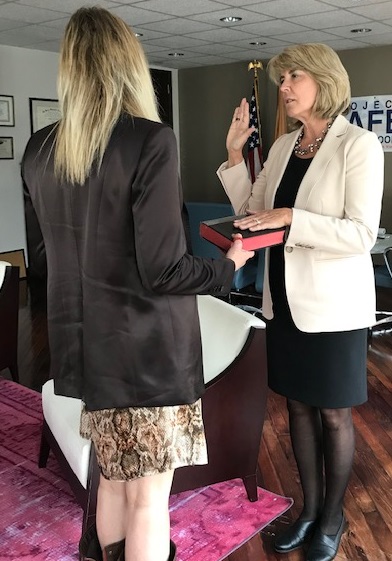Sex offenders
SMART FY 2023 Fellowship Program: Sex Offender Registry Law Enforcement Liaison and Sexual Violence Prevention Fellowships
SMART FY 2023 Support for Adam Walsh Act Implementation Grant Program
SMART FY 2022 Sexual Violence Prevention Initiative
SMART FY 2022 Maintenance and Operation of the Dru Sjodin National Sex Offender Public Website
SMART FY 2022 Support for Adam Walsh Act Implementation Grant Program
SMART FY 2021 Invitation to Apply — Maintenance and Operation of the Dru Sjodin National Sex Offender Public Website
SMART FY 2021 Keep Young Athletes Safe
The Utility of Sex Offender Registration for Stranger-Perpetrated Sex Crimes
Incidents involving a stranger perpetrator were closed significantly faster after a registry was implemented in the state.
The FBI-maintained National Sex Offender Registry is a multifaceted tool used by law enforcement to track and monitor persons who are convicted of sex crimes. What may be less recognized, and less often studied, is the ability of a sex offender registry to function as an investigatory database...
SMART remembers, mourns the loss of tribal SORNA officers to COVID
In June and September, tribal communities lost two SORNA officers who had been key to implementing the Sex Offender Registration and Notification Act (SORNA) on tribal lands. In June, Navajo Nation Police Officer Michael Lee was the first Navajo officer to die from COVID-19. In September, White Mountain Apache Tribal Police SORNA Compliance Specialist Elmer Lamson also died of COVID-19. As SORNA officers, Lee and Lamson played...
Research
Sex Offender Risk Assessment: State-Level Policies for Determining Registration and Notification Requirements
This report from the Federal Research Division at the Library of Congress presents an analysis of how states use risk assessments to determine aspects of offenders’ registration and notification requirements.
Sex Offender Registration and Notification Act—Summary and Assessment of Research
This report from the Federal Research Division at the Library of...
SMART FY 2020 Keep Young Athletes Safe Continuation
Recognizing a Decade of Progress at SMART
For the past 10 years, the Office of Sex Offender Sentencing, Monitoring, Apprehending, Registering, and Tracking (SMART) has been at the forefront of implementing effective practices to register and manage sex offenders.
This summer, we'll be recognizing the 10th anniversary of the Adam Walsh Child Protection and Safety Act of 2006. This legislation, named after the 6-year-old boy whose senseless murder led to increased public...
SMART Office Recognizes the 10th Anniversary of the Adam Walsh Act
It's been a decade since the passage of the Adam Walsh Child Protection and Safety Act of 2006, enacted in memory of the 6-year-old boy whose brutal murder brought national attention to the dangers posed by child predators and other violent offenders.
We've come a long way over those 10 years in meeting the complex challenges of sex offender management and building a...
How Tribes can "TAP" into Information Databases
Ten tribes are participating in a new phase of the roll-out of the Tribal Access Program, a valuable tool available from the Department of Justice that improves public safety as it allows tribes to access and exchange criminal justice information. Launches have already occurred at Fort Peck, Makah and Standing Rock, and others are scheduled throughout the summer. The Attorney General recently highlighted TAP as...
Sex Offender Management and Prevention Vital to Campus Safety
As many recent high school graduates begin preparing to leave for college, they and their parents are likely thinking about on-campus safety. Specifically, they might have questions about their prospective school's efforts to prevent sexual assault on campus. Media coverage focusing on trends in sexual assault and thematic issues like victim-blaming has heightened awareness of this problem. And research continues to reveal the extent to...
What Do We Know About Sex Offenders?
What comes to mind when you hear the phrase "sex offender"? We know that sex offenders, like the general criminal population, are not a monolithic group. Some sex offenders are pedophiles, some act out in response to their own abuse and some commit these crimes as part of an overall criminal lifestyle. While some may reoffend regardless of criminal justice intervention, some respond well to...
The National Sex Offender Public Website: Your Go-To Resource for Sex Offender Information
There are many things to think about when planning a move to a new area and a new home: are the schools good, what will the taxes be, what will the commute be like, are there sex offenders nearby? Similar to finding out what the amenities or pitfalls are when you consider a new home, it's also good to locate where sex offenders live, work...
SMART Forges Partnerships to Manage Sex Offenders
On July 27, 1981, 6-year-old Adam Walsh entered a Florida department store with his mother. He was abducted by a stranger, and his remains were found two weeks later. The tragedy of the young boy's murder—a brutal crime that was never brought to trial—shocked the nation. His devastated family and supporters channeled their grief and anger in a positive way―to protect other children from sexual...
SMART Office Welcomes New Director
In March, the Office of Sex Offender Sentencing, Monitoring, Apprehending, Registering, and Tracking welcomed a new Director, Kendel Ehrlich. She previously served as the Deputy Director of the White House's Office of National Drug Control Policy. In that position, Kendel specialized in external communications combatting the opioid crisis with particular emphasis on ONDCP's High-Intensity Drug Trafficking Areas and Drug-Free Communities programs.
Prior to joining the...
The Dru Sjodin National Sex Offender Public Website
Originally launched in 2005, NSOPW.gov is the only federal website that searches public sex offender registries in all 50 states, the District of Columbia, the five principal U.S. territories and participating federally recognized Indian tribes. One search provides comprehensive, up-to-date sex offender information—at any time, from anywhere, for free.
See the YouTube Terms of Service and Google Privacy Policy
How the Sex Offender Registry Tool Can Help You
The Sex Offender Registry Tool (SORT) is a sex offender management application provided to states and territories by the U.S. Department of Justice and the Office of Sex Offender Sentencing, Monitoring, Apprehending, Registering, and Tracking (SMART). SORT helps states and territories to implement the Sex Offender Registration and Notification Act registry system requirements. Available at no cost, SORT was designed to make the sex offender registry system setup and maintenance process as efficient and effective as possible.
See the YouTube Terms of Service and Google Privacy Policy



